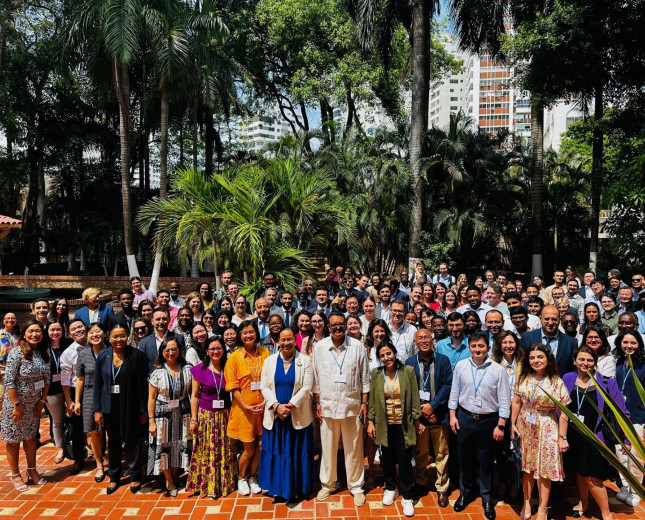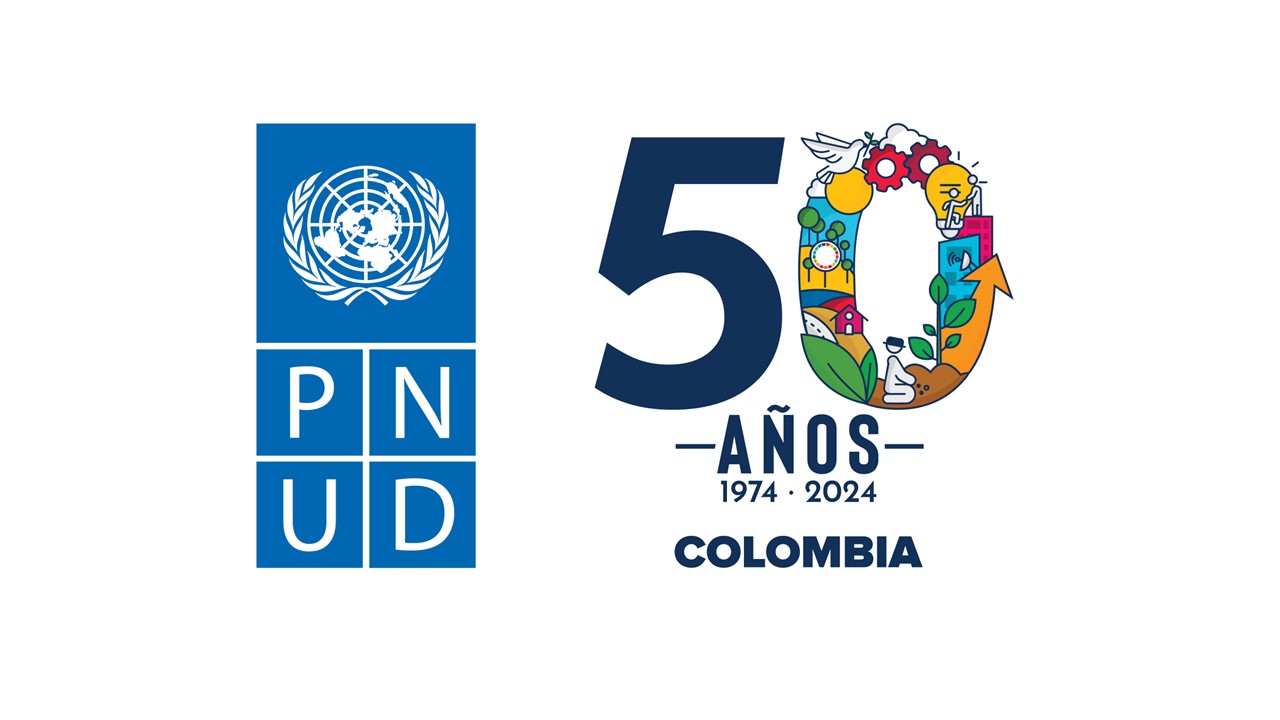Credit: UNFCCC secretariat and Republic of Colombia
Background
At COP 21 Parties decided that the CMA will set a new collective quantified goal on climate finance (NCQG) from a floor of USD 100 billion per year, taking into account the needs and priorities of developing countries, prior to 2025. CMA 1 decided to initiate at its third session, in accordance with Article 9, paragraph 3 of the Paris Agreement, deliberations on setting the NCQG from a floor of USD 100 billion per year in the context of meaningful mitigation actions and transparency of implementation and taking into account the needs and priorities of developing countries, and agreed to consider in those deliberations the aim to strengthen the global response to the threat of climate change in the context of sustainable development and efforts to eradicate poverty, including by making finance flows consistent with a pathway towards low greenhouse gas emissions and climate-resilient development.
At CMA 3, Parties decided that the NCQG aims at contributing to accelerating the achievement of Article 2 of the Paris Agreement of holding the increase in the global average temperature to well below 2 °C above pre-industrial levels and pursuing efforts to limit the temperature increase to 1.5 °C above pre-industrial levels, recognizing that this would significantly reduce the risks and impacts of climate change; increasing the ability to adapt to the adverse impacts of climate change and foster climate resilience and low greenhouse gas emission development in a manner that does not threaten food production; and making finance flows consistent with a pathway towards low greenhouse gas emission and climate-resilient development.
At CMA 5, Parties decided to transition to a mode of work that enables the development of a substantive framework for a draft negotiating text for consideration by CMA 6. Parties also requested the co-chairs of the ad hoc work programme to develop and publish by March 2024 a workplan for 2024, taking into account submissions to be made by Parties. Additionally, the CMA also requested the co-chairs to conduct at least three technical expert dialogues in 2024 to allow for in-depth technical discussions on the elements of the NCQG back-to-back with three meetings under the ad hoc work programme to enable Parties to engage in developing the substantive framework for a draft negotiating text capturing progress made.
As outlined in the co-chairs’ workplan in 2024, to enable the development of a substantive framework for a draft negotiating text, the technical expert dialogues will continue to allow for in-depth technical discussions on the elements of the NCQG, including interlinkages between elements, and building on the options identified in 2023 in the co-chairs’ annual report and its addendum. The dialogues would be informed by the outcomes of the meetings under the ad hoc work programme.
Objective
The ninth technical expert dialogue aims to identify further options on areas that Parties identified for further consideration, streamline and refine the options identified in the co-chairs’ annual report, and explore interlinkages between options.
Format and participation
The technical expert dialogues are mandated to be held in different regions. The ninth technical expert dialogue will take place over two days in Cartagena, Colombia, and is open to nominated Party and non-Party stakeholders for on-site participation. To ensure inclusive and broader participation, the dialogue will be held in a hybrid format, enabling virtual participation. As mandated, the dialogue will have webcast.
The technical expert dialogues in 2024 will be organized to facilitate technical discussions on the NCQG, comprising primarily of focused working groups where participants are tasked with identifying and developing options, including challenges and opportunities, for specific elements of the NCQG that Parties consider missing in the 2023 co-chairs’ annual report, streamline and refine already identified options, and reflect on interlinkages between options. In addition, after each working group session, sufficient time will be dedicated to report back on the outcomes of the discussions identified, and for open discussion among all participants to exchange views on the options.
In addition, the technical expert dialogues also present an opportunity for dynamic and interactive exchanges of a wide range of perspectives and experiences on the potential design and implementation of the NCQG. The provisional programme presents the themes and topics for discussion at the ninth technical expert dialogue. It takes into account the views expressed by Parties and non-Party stakeholders in their submissions as well as the views expressed during informal consultations held with interested groups of Parties upon their request in February and March 2024. Guiding questions for each topic are outlined further below.
Provisional programme
LIVE WEBCAST LINKS
|
|
|
23 April 2024
|
|
|
24 April 2024
|
|
Day 1: Tuesday, 23 April 2024
|
| Time (UTC-5) |
Session titles/description |
Speakers and Facilitators |
| 08:00 |
Registration |
| 09:00 –09:25 |
Opening and welcoming remarks |
- Daniele Violetti, UNFCCC secretariat
- H. E. Elizabeth Taylor Jay, bio Vice Minister, Multilateral Affairs, Colombia
- Omar Al Braiki, bio COP 28 Presidency
Moderators: Fiona Gilbert and Zaheer Fakir, co-chairs of the ad hoc work programme on the NCQG bio
|
| 09:25–10:00 |
Introductory remarks (15–20 min)
This session will take stock of the work undertaken thus far and reflect on the progress made under the ad hoc work programme to date. In doing so, the co-chairs will provide key highlights of technical discussions held, including the elements and options identified in 2023 and as presented in the 2023 co-chairs’ annual report. This session will also present an overview of the NCQG workplan in 2024 which outlines the overall approach to the organization of the work, including milestones and timelines.
Introduction to working groups (10 min)
The co-chairs will briefly outline the approach and modalities for the working group sessions and divide in-person participants into five working groups and the virtual participants separately.
|
Introduction by the co-chairs
Moderators: Fiona Gilbert and Zaheer Fakir, co-chairs of the ad hoc work programme on the NCQG
|
| 10:00 – 10:30 |
Coffee break |
|
| 10:30 – 12:00 |
Working groups: Working groups on identifying outstanding options (80 min)
Technical discussions on elements identified by Parties as requiring more in-depth discussion.
Building on the 2023 co-chairs’ annual report, participants are asked to identify elements they consider have not been sufficiently discussed and develop options on those elements. In doing so, participants are also invited to reflect on challenges and opportunities associated with implementing each option.
Guiding questions:
- What elements of the NCQG have not been adequately addressed in the previous technical discussions, if any?
- What are possible options for implementing each proposed element?
- What is the rationale for including these proposed options?
|
| 12:00 –13:00 |
Lunch |
| 13:00 – 14:00 |
Working groups: Working groups on identifying outstanding options (60 min) continuation
|
| 14:00–14:30 |
Coffee break
|
|
14:30 –16:15
|
Ice breaking activity (15 min)
Report back of working groups and open discussions (90 min)
|
Moderator: Fiona Gilbert and Zaheer Fakir, co-chairs of the ad hoc work programme on the NCQG |
| 16:15 – 16:30 |
Wrap-up of the day (10–15 min)
|
Moderators: Fiona Gilbert and Zaheer Fakir, co-chairs of the ad hoc work programme on the NCQG |
|
Day 2: Wednesday, 24 April 2024
|
| Time (UTC-5) |
Session titles/description |
Speakers and Facilitators |
|
09:00 – 09:20
|
Recap and introduction |
Recap from day I
Moderators: Fiona Gilbert and Zaheer Fakir, co-chairs of the ad hoc work programme on the NCQG |
| 09:20 – 10:50 |
Working groups: Working groups on linkages and interdependencies (90 min)
Building on the options identified in 2023 for each element of the NCQG, participants will be invited to identify and discuss linkages across each element and associated options for each element. In doing so, participants will also consider each element’s impacts on other elements of the NCQG, and subsequently reflect on implications resulting from such linkages when refining and streamlining options across each element.
Guiding questions:
- What are the key linkages and interdependencies between the elements of the NCQG and options outlined in the 2023 co-chairs’ annual report? In particular, what is the relationship between:
- What are the implications of the identified linkages across the NCQG’s elements and options identified for each element when formulating the NCQG?
|
| 10:50 – 11:20 |
Coffee break
|
| 11:20 – 12:20 |
Working groups: Working groups on linkages and interdependencies (continuation) (60 min)
|
| 12:20 - 13:30 |
Lunch |
|
13:30 – 15:00
|
Ice breaking activity (10 min)
Report back and discussions (80 min)
|
Moderators: Fiona Gilbert and Zaheer Fakir, co-chairs of the ad hoc work programme on the NCQG
|
| 15:00 – 15:15 |
Coffee break
|
| 15:15 – 16:15 |
Identifying opportunities for streamlining (60 min)
During this session, participants are invited to reflect on opportunities for streamlining options.
|
Moderators: Fiona Gilbert and Zaheer Fakir, co-chairs of the ad hoc work programme on the NCQG
|
|
16:15 – 16:30
|
Closing remarks |
- Elmaddin Mehdiyev, bio Incoming COP 29 Presidency
Moderators: Fiona Gilbert and Zaheer Fakir, co-chairs of the ad hoc work programme on the NCQG
|

